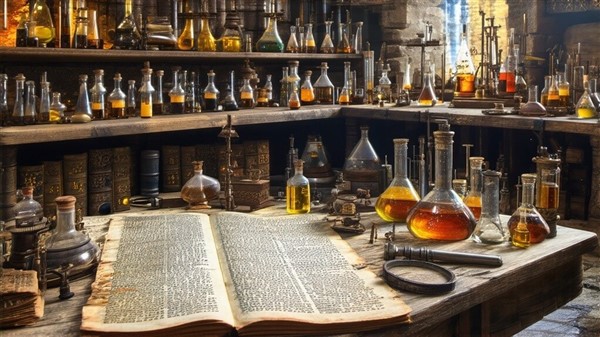1. Introduction
Alchemy, often perceived as the mystical forerunner to the empirical science of chemistry, has a rich and complex history that stretches back to antiquity. Originating from practices in ancient Egypt and the Hellenistic world, alchemy was not merely an early form of chemistry; it was also a philosophical and spiritual tradition that sought to understand the nature of matter and human destiny (Principe, 2013). Alchemists aimed to purify, mature, and perfect certain materials, most famously attempting to convert base metals into noble metals like gold, and to discover the elixir of life, a universal cure for disease and a means of prolonging life (Newman, 2006).
The transformation of alchemy into modern chemistry was marked by significant philosophical shifts and advancements in experimental methods, particularly during the 16th and 17th centuries. This evolution was propelled forward by key figures such as Robert Boyle and Antoine Lavoisier, whose works laid the groundwork for chemical sciences to develop as a rigorous discipline grounded in precise measurement, experimentation, and the formulation of theories based on empirical evidence (Moran, 2005). This blog post will explore how the esoteric and often secretive practices of medieval alchemists evolved into the systematic and public scientific field known today as chemistry, highlighting the enduring impacts of alchemical traditions on modern scientific thought and methodology (Linden, 2003).
2. The Ancient Roots of Alchemy
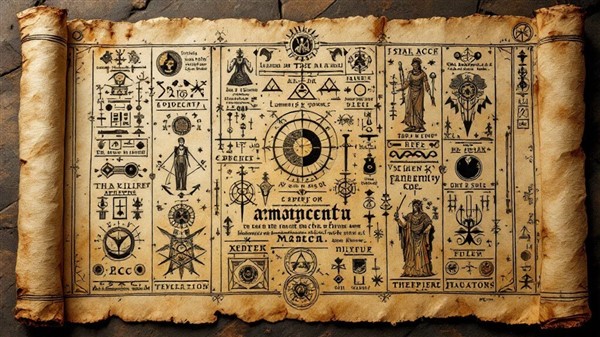
2.1. Origins and Early Practices
Alchemy’s origins can be traced back to several ancient cultures, each contributing uniquely to its development. In Egypt, the practice began with the embalming and mummification processes, which involved chemical knowledge about preserving materials, and evolved into more metaphysical pursuits (Linden, 2003). The Greeks furthered alchemy through the influence of philosophical ideas from Plato and Aristotle, who discussed the transformation of substances at a fundamental level (Ball, 2008). In the Islamic world, alchemists like Jabir ibn Hayyan contributed significantly to both theoretical and practical aspects of alchemy, including the development of numerous laboratory techniques and the introduction of strong acids (Holmyard, 1990).
These early alchemists were primarily driven by goals such as the creation of the philosopher’s stone, believed to grant immortality and to turn base metals into gold. Their methods were an amalgam of mysticism, experimentation, and proto-scientific research, often cloaked in symbolic and secretive language to protect their knowledge and also due to the fear of persecution (Principe, 2013). This era was characterized by a blend of practical chemical processes and a rich tapestry of spiritual and esoteric goals, setting the stage for the complex evolution of alchemy into a more empirical science (Newman, 2006).
2.2. The Alchemical Worldview
The philosophical and spiritual underpinnings of alchemy were deeply integrated into its practices. Alchemists viewed their work as a spiritual quest, not merely for material gain but for ultimate truth and enlightenment (Linden, 2003). The transformation of matter was seen as parallel to a spiritual transformation, with the ultimate goal of harmonizing the human soul with the divine nature of the universe (Powers, 2012). This worldview was influenced by hermetic philosophy, which posited that all forms of life are interconnected and that transformations in one realm could induce transformations in another (Eliade, 1978).
This search for universal truths led to the pursuit of the transmutation of matter, where alchemists sought to understand and manipulate the fundamental building blocks of the world. Their work was a precursor to the later scientific approach in seeking repeatable and explainable phenomena, yet it remained deeply rooted in mystical and philosophical contexts (Moran, 2005). The alchemical tradition thus served as a bridge between ancient metaphysical practices and the beginnings of modern science, influencing the development of scientific methods and the shift towards more empirical forms of inquiry (Newman, 2006).
3. The Transition from Alchemy to Chemistry
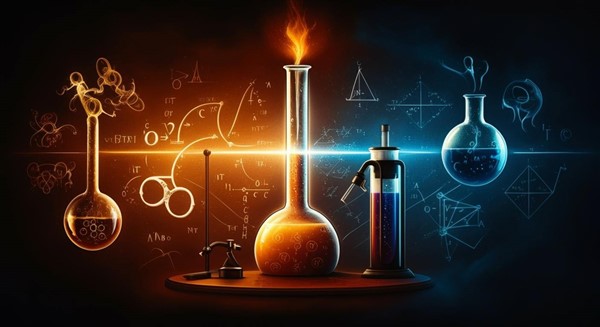
3.1. Key Figures and Discoveries
The transformation of alchemy into modern chemistry was significantly influenced by figures such as Robert Boyle and Antoine Lavoisier, whose experiments laid the foundations for chemistry as a science of matter and its transformations. Robert Boyle, often considered the father of modern chemistry, challenged the traditional alchemical theories with his work, which emphasized the importance of experimental methodology and quantitative measures. His publication, “The Sceptical Chymist” (1661), argued for the concept of elements as simple substances that could not be broken down further, which was a radical departure from the alchemical focus on the transmutation of metals (Boyle, 1661).
Antoine Lavoisier further revolutionized chemistry with his theory of combustion, overthrowing the phlogiston theory that had dominated chemical thought for decades. His meticulous experiments demonstrated that combustion and respiration were caused by chemical reactions with a substance in the air, later named oxygen, which led to the law of conservation of mass in chemical reactions (Conant, 1950). These figures were pivotal in moving away from mystical interpretations of matter to a more systematic and empirical approach, setting the stage for all modern chemical research.
3.2. The Rise of Empiricism and Experimentation
The shift towards empiricism and experimentation in the seventeenth and eighteenth centuries marked a significant transformation in the scientific method, influencing the development of modern chemistry. This period saw an increased reliance on observation, experimentation, and the formulation of hypotheses that could be tested and falsified (Shapin, 1996). The establishment of societies such as the Royal Society in London and the Academy of Sciences in Paris provided institutional support for this new approach, fostering an environment where systematic experimentation and the sharing of results could flourish (Hall, 1983).
The empirical methods advocated by scientists like Boyle and Lavoisier emphasized the importance of accurate measurement and careful observation, leading to more precise chemical analyses and reproducible results (Brock, 1992). This approach was crucial in moving away from the speculative nature of alchemy to a more rigorous, evidence-based discipline that sought to understand the principles governing the natural world through controlled experiments.
3.3. The Emergence of Modern Chemical Theories
The development of modern chemical theories was a culmination of these empirical advancements, significantly shaped by scientists such as John Dalton and Dmitri Mendeleev. Dalton’s atomic theory, proposed in the early 19th century, introduced the idea that each chemical element is composed of atoms of a single, unique type and that chemical reactions involve the rearrangement of these atoms (Thackray, 1972). This theory provided a systematic explanation for chemical reactions and laid the groundwork for later developments in chemistry.
Dmitri Mendeleev further advanced chemical theory with his development of the periodic table, which organized elements based on their atomic mass and chemical properties, predicting the properties of elements yet to be discovered (Scerri, 2007). This not only demonstrated the predictive power of chemical theory but also provided a unifying framework that has been fundamental to both chemical research and education. The contributions of these scientists were instrumental in transforming chemistry into a modern science, characterized by its predictive capabilities and systematic categorization of elements.
4. The Legacy and Impact of Alchemy
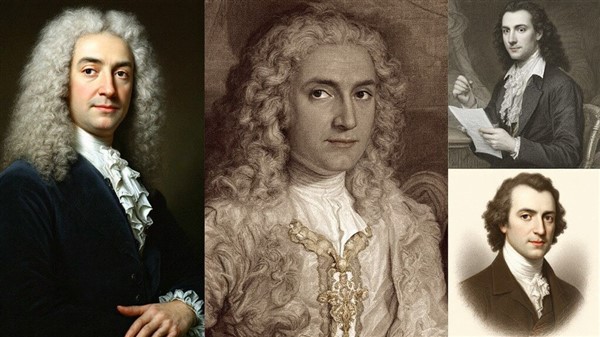
4.1. Philosophical and Cultural Influences
Alchemy has deeply influenced the philosophical and cultural landscapes, integrating into various fields such as art, literature, and psychology. The alchemical tradition, with its rich symbolism and quest for transformation, found resonance in the literary works of figures like Dante and Shakespeare, where alchemical metaphors illustrated themes of transformation and enlightenment (Jung, 1944). In art, icons and themes from alchemy frequently appeared in the Renaissance and Baroque periods, reflecting the period’s fascination with transformation and the mysteries of nature (Roob, 2006). These expressions are not merely historical footnotes but continue to impact contemporary works, where the metaphor of alchemy symbolizes personal and societal transformation.
The psychological interpretations of alchemical imagery, particularly by Carl Jung, further exemplify its cultural impact. Jung postulated that alchemical symbols were manifestations of the psychoanalytic process, representing the individuation of the self (Jung, 1968). This view positions alchemy at the heart of deep psychological processes and suggests that the alchemists’ work on external substances was also an inward journey. Thus, alchemy’s symbolism extends beyond the literal to touch on themes of self-discovery and the exploration of the human psyche, enduring in modern psychological thought and practice.
4.2. Alchemy’s Influence on Modern Science
The influence of alchemy on modern science is both nuanced and significant. While it is often regarded as a precursor to chemistry, alchemy contributed foundational practices and principles that have shaped various scientific disciplines. The alchemical emphasis on experimentation, observation, and the transformation of matter laid groundwork for scientific methods, particularly in chemistry and pharmacology (Newman, 2006). Alchemists developed techniques such as distillation and sublimation that are still fundamental in modern laboratories (Principe, 2012). Their work on metals and minerals directly contributed to the development of metallurgy and materials science.
Moreover, the alchemists’ quest to understand the composition and properties of substances has perpetuated a long-standing interest in the fundamental nature of matter, influencing not only chemistry but also modern physics. The transformation of elements, central to alchemy, echoes in the contemporary fields of nuclear physics and quantum chemistry, where the conversion and interaction of particles at an atomic level are key areas of research (Morris, 1987). This ongoing search reflects the enduring legacy of alchemical pursuits, highlighting a continuum in scientific inquiry from the alchemists’ speculative experiments to cutting-edge scientific research today.
5. Conclusion
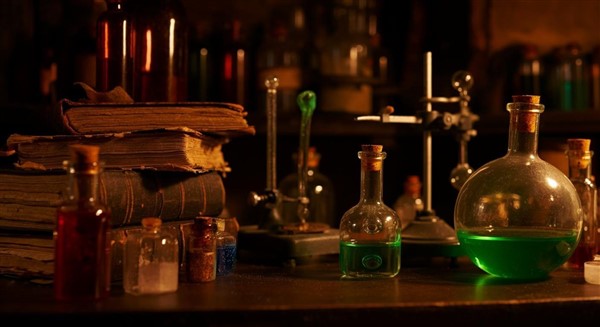
The transition from alchemy to chemistry marks one of the most significant metamorphoses in the history of science, encapsulating a journey from mystical pursuits to empirical science. This transformation was not merely a change in the methods and materials of study, but a philosophical revolution that redefined humanity’s place in the natural world. Alchemy, with its roots steeped in the pursuit of profound secrets like the philosopher’s stone and the elixir of life, gradually evolved into the science of chemistry through the contributions of pioneers like Robert Boyle and Antoine Lavoisier. Their insistence on verifiable experiments and quantifiable results shifted the focus from mystical transmutation to the systematic study of material substances. This evolution was marked by the abandonment of the esoteric goals of alchemy and the adoption of a methodology that values reproducibility, precision, and predictability, laying the foundational principles of modern science.
The importance of this transition extends beyond the confines of chemical science, influencing various fields and fundamentally altering our understanding of the universe. The methodological transformations initiated in the chemical sciences paved the way for the development of modern scientific disciplines, establishing principles such as the conservation of mass, atomic theory, and eventually the periodic table. These developments have not only enhanced our understanding of the material world but have also enabled technological advancements that have dramatically reshaped human society. From the synthesis of new materials and pharmaceuticals to the comprehension of biological processes and the conservation of the environment, the impacts of chemistry are pervasive and profound. Thus, the legacy of alchemy, with its rich symbolism and philosophical depth, continues to be felt, reminding us that the quest for knowledge is both a transformation of the external world and an introspective journey of human thought.
6. References
Ball, P. (2008). The Devil’s Doctor: Paracelsus and the World of Renaissance Magic and Science. Farrar, Straus and Giroux.
Boyle, R. (1661). The Sceptical Chymist.
Brock, W. H. (1992). The Fontana History of Chemistry. Fontana.
Conant, J. B. (1950). Harvard Case Histories in Experimental Science. Harvard University Press.
Eliade, M. (1978). The Forge and the Crucible: The Origins and Structure of Alchemy. University of Chicago Press.
Hall, A. R. (1983). The Revolution in Science 1500-1750. Longman.
Holmyard, E. J. (1990). Alchemy. Dover Publications.
Jung, C. G. (1944). Psychology and Alchemy. Princeton University Press.
Jung, C. G. (1968). Alchemy. Princeton University Press.
Linden, S. J. (2003). The Alchemy Reader: From Hermes Trismegistus to Isaac Newton. Cambridge University Press.
Moran, B. T. (2005). Distilling Knowledge: Alchemy, Chemistry, and the Scientific Revolution. Harvard University Press.
Morris, R. (1987). Time’s Arrows: Scientific Attitudes Toward Time. Simon & Schuster.
Newman, W. R. (2006). At the Crossroads of Magic and Science: Studies in the History of Medieval and Early Modern Science. Pontifical Institute of Medieval Studies.
Powers, J. (2012). In the Light of Medieval Spain: Islam, the West, and the Relevance of the Past. Palgrave Macmillan.
Principe, L. M. (2013). The Secrets of Alchemy. University of Chicago Press.
Roob, A. (2006). Alchemy & Mysticism. Taschen.
Scerri, E. R. (2007). The Periodic Table: Its Story and Its Significance. Oxford University Press.
Shapin, S. (1996). The Scientific Revolution. University of Chicago Press.
Thackray, A. (1972). John Dalton: Critical Assessments of His Life and Science. Harvard University Press.


 ByKus
ByKus Historia
Historia Logos
Logos Humanitas
Humanitas Aesthetica
Aesthetica Cinemania
Cinemania Lingua
Lingua Mythos
Mythos Theologia
Theologia Bibliotecha
Bibliotecha Persona
Persona Quid
Quid News
News Politico
Politico Mundialis
Mundialis Oeconomia
Oeconomia Athletica
Athletica Technologia
Technologia Medicina
Medicina Scientia
Scientia Astronomia
Astronomia
